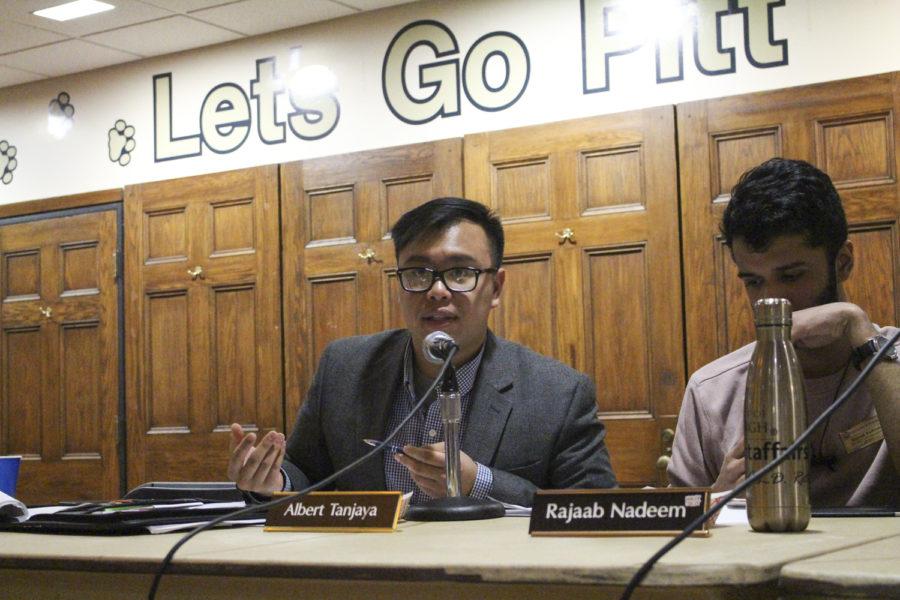SGB takes care of business, SafeRider, elections
Hannah Heisler | Staff Photographer
Board member Albert Tanjaya discusses updates and fixes to the current SafeRider app interface.
February 13, 2019
Although elections for next year’s board are only one week away, Student Government Board has still been working on student initiatives like updating the SafeRider application and starting a summer program for a business minor.
At a meeting Tuesday night, board member Albert Tanjaya announced that he and the University Department of Transportation requested two changes to SafeRider from Ride Systems, the app the University currently uses. First, they submitted a request to upgrade the app’s user interface and increase its user-friendliness.
“The SafeRider app, in concept, is great, but when you look at it, you have an estimated arrival time that never shows you a real number, you have very glitchy buttons that don’t direct you to anything and you have many outlets to click the same thing,” Tanjaya said.
According to Tanjaya, the second, more long-term goal is finding a third-party vendor to fix the app’s user interface, operations and ease of navigation. He said he wants to fix many of the GPS tracking issues with the current version, saying the new SafeRider app could resemble the navigation app Waze.
Tanjaya also said students often use the app as a substitute for the Pitt Police, rather than its intended function as an all-purpose ride service. He said he’s hopeful SafeRider will engage in discussions both about fixing the internal issues and about the brand itself so students understand its accessibility.
“SafeRider isn’t supposed to just be your safe taxi,” Tanjaya said. “It’s supposed to be a universal shuttle that you can use to take anywhere on campus.”
Later in the meeting, board member Cole Dunn announced the upcoming distribution of a survey to gauge interest in a summer business minor. Dunn, who presented the idea for this minor after winter break, has been working with the Academic Affairs Committee to create a program that would allow Dietrich students to obtain a business minor.
“It’s super easy to major in the arts and sciences school as a business major,” Dunn said. “But it’s impossible currently to get a business minor in the arts and sciences school.”
Dunn said he got the idea in high school when he found out about Villanova’s 10-week summer business school, a program he wants to emulate at Pitt. He also said the Academic Affairs Committee tried something like this in the past, but it fell through due to lack of funding and overcrowded classrooms.
Though he could not provide a specific timeline for the minor, Dunn stressed the importance of the initiative for students to obtain a well-rounded education.
“You have a lot of kids in communications majors who are going into the field of marketing but can’t take marketing classes because it’s not within their school,” Dunn said.
To bridge this gap, Dunn said, SGB will distribute the survey to gather student input on social media on Thursday.
After the two presidential candidates faced off in a debate Monday night, SGB is looking ahead to the 2019 elections. SGB will send a survey with the traditional ballot on Tuesday, which students can fill out online or find at my.pitt.edu. After submitting their votes, the email will provide a link to complete a five-question survey. Elections Committee Chair Katie McLaughlin said the survey will first collect student class, club affiliations and major.
McLaughlin said the survey will then ask the respondent how they heard about the election and what they want the newly elected board to focus on. She said this survey, which is the first of its kind, can provide data about who’s voting, why they’re voting and what issues they’re voting for.
“We want a better idea of who we are actually reaching on campus,” McLaughlin said.
She said last year 3,357 students voted in the SGB election out of approximately 18,000 eligible students, a little more than 18 percent. Ideally, McLaughlin said, the survey will identify which campus communities SGB needs to work on communicating with in order to increase future turnout.
“We want to know what majors or clubs we aren’t reaching for turnout to find out what’s not working,” McLaughlin said. “Hopefully next year we’ll really be able to use this data to help us market better and get the word out about voting more.”
Allocations
Engineers for a Sustainable World requested $2,000 for a conference. The board approved in full.
Filipino Students Association requested $5,827.60 for their annual Barrio program. The board approved $5,827.58 and denied $0.02.
Phi Beta Lambda requested $1,234.32 for a conference. The board approved in full.
African Students Organization requested $11,644.96 for their WAZOBIA Fashion Show. The board approved $9,404 and denied $2,240.96.








